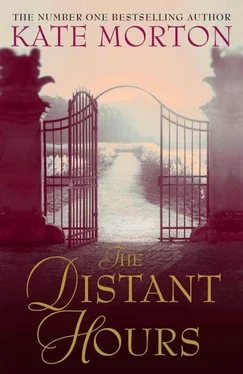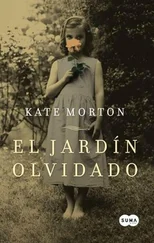‘I don’t suppose there’s anything else that needs attention?’ A faint pleading note had crept into her voice. ‘I thought I might send him around on Saturday to do some general maintenance.’
‘I told you. Everything’s fine.’
She looked surprised and hurt and I knew I’d spoken brusquely, only these dreadful conversations in which I pretended all was going swimmingly were wearing me down. Despite my willingness to disappear inside story books, I’m not a liar and I don’t cope well with subterfuge. Under ordinary circumstances this might have been the perfect time for me to break the news about Jamie – but I couldn’t, not when I wanted to steer us back to Milderhurst and Juniper Blythe. In any case, the man at the next table chose that very instant to turn around and ask whether he could borrow our salt shaker.
As I handed it to him, Mum said, ‘I have something for you.’ She pulled out an old M &S bag, folded over to protect whatever was inside. ‘Don’t get too excited,’ she added, passing it to me. ‘It’s nothing new.’
I opened the bag, slipped out the contents and stared in puzzlement for a moment. People are often giving me things they think are worth publishing, but I couldn’t believe anyone could be that far off the mark.
‘Don’t you remember?’ Mum was looking at me as if I’d forgotten my own name.
I gazed again at the stapled wad of paper, the child’s drawing on the front, the ill-formed words at the top of the page: The Book of Wet Animals , Written and Illustrated by Edith Burchill. A little arrow had been inserted between of and Wet and the word Magical added in a different-coloured pen.
Mum said, ‘You wrote it. Don’t you remember?’
‘Yes,’ I lied. Something in Mum’s expression told me it was important to her that I did, and besides – I ran my thumb over an inky blob made by a pen allowed to rest too long between strokes – I wanted to remember.
‘You were so proud of it.’ She tilted her head to look at the little bundle in my hands. ‘You worked on it for days, crouched over on the floor beneath the dressing table in the spare room.’
Now that was familiar. A delicious memory of being tucked in the warm, dark space withdrew itself from long-term storage and my body tingled with its release: the smell of dust in the circular rug, the crack in the plaster just large enough to store a pen, the hardness of wooden boards beneath my knees as I watched the sunlight sweep across the floor.
‘You were always working on one story or another, scribbling away in the dark. Your father worried sometimes that you were going to turn out shy, that you’d never make any friends, but there was nothing we could do to dampen your enthusiasm.’
I remembered reading but I didn’t remember writing. Still, Mum’s talk of dampening my enthusiasm struck a nerve. Distant memories of Dad shaking his head incredulously when I returned from the library, asking me over dinner why I wasn’t borrowing from the non-fiction shelves, what I wanted with all that fairy nonsense, why I didn’t want to learn about the real world.
‘I’d forgotten that I wrote stories,’ I said, turning the book over and smiling at the pretend publisher’s logo I’d drawn on the back.
‘Well.’ She wiped an old crumb from the table. ‘Anyway, I thought you should have it. Your father’s been pulling boxes down from the attic, that’s how I came to find it. No point leaving it for the silverfish, is there? You never know, you may even have your own daughter to show it to one day.’ She straightened in her seat and the rabbit hole to the past closed behind her. ‘Tell me,’ she said. ‘How was your weekend? Did you do anything special?’
And there it was. The perfect window, curtains drawn wide. I couldn’t have constructed a better opening for myself if I’d tried. And as I looked down at The Book of Magical Wet Animals in my hand, the time-dusted paper, the imprints from felt pens, the childish shading and colouring; as I realized that my mum had kept it all this time, that she’d wanted to save it despite her misgivings about my wasteful occupation, that she’d chosen today, of all days, to remind me of a part of myself I’d quite forgotten; I was overcome by a sudden swelling desire to share with her everything that had happened to me at Milderhurst Castle. A sweet sense that it would all work out for the best.
‘Actually,’ I said. ‘I did.’
‘Oh?’ She smiled brightly.
‘Something very special.’ My heart had begun to gallop ahead; I was watching myself from the outside, wondering, even as I teetered on the cliff edge, whether I was really going to jump. ‘I went for a tour,’ said a faint voice rather like my own, ‘inside Milderhurst Castle.’
‘You… You what?’ Mum’s eyes widened. ‘You went to Milderhurst?’ Her gaze held mine as I nodded, then it dropped. She shifted her cup on the saucer, swivelled it by its dainty handle, this way and that, and I watched with cautious curiosity, unsure what was about to happen, eager and loath, in equal measure, to find out.
I ought to have had more faith. Like a brilliant sunrise clarifying the clouded horizon, dignity reasserted itself. She lifted her head and smiled across the table as she set her saucer straight. ‘Well now,’ she said. ‘Milderhurst Castle. And how was it?’
‘It was… big.’ I work with words and that was the best I could come up with. It was the surprise, of course; the utter transformation I’d just witnessed. ‘Like something out of a fairy tale.’
‘A tour, did you say? I didn’t realize one could do such a thing. That’s our modern times, I suppose.’ She waved a hand. ‘Everything for a price.’
‘It was informal,’ I said. ‘One of the owners took me. A very old lady called Persephone Blythe.’
‘Percy?’ A tiny tremble in her voice; the only prick in her composure. ‘Percy Blythe? She’s still there?’
‘They all are, Mum. All three. Even Juniper, who sent you the letter.’
Mum opened her mouth as if to speak; when no words came out she closed it again, tightly. She laced her fingers in her lap, sat as still and as pale as a marble statue. I sat too, but the silence took on weight and it became more than I could bear.
‘It was eerie,’ I said, picking up my teapot. I noticed that my hands were shaking. ‘Everything was dusty and dim and to see them all sitting in the parlour together, the three of them in that big, old house – it felt a little like I’d stumbled inside a doll’s-’
‘Juniper, Edie – ’ Mum’s voice was strange and thin and she cleared her throat – ‘how was she? How did she seem?’
I wondered where to start: the girlish joy, the dishevelled appearance, the final scene of desperate accusations. ‘She was confused,’ I said. ‘She was wearing an old-fashioned dress and she told me she was waiting for someone, a man. The lady at the farmhouse where I stayed said that she isn’t well, that her sisters look after her.’
‘She’s ill?’
‘Dementia. Sort of.’ I continued carefully: ‘Her boyfriend left her years ago and she never fully recovered.’
‘Boyfriend?’
‘Fiancé to be precise. He stood her up and people say it drove her mad. Literally mad.’
‘Oh, Edie,’ said Mum. The slightly ill look on her face resolved into the sort of smile you might give a clumsy kitten. ‘Always so full of fancy. Real life isn’t like that.’
I bristled: it gets tiresome being treated like an ingénue. ‘I’m just telling you what they said in the village. A lady there said Juniper was always fragile, even when she was young.’
‘I knew her, Edie; I don’t need you telling me what she was like when she was young.’
Читать дальше












